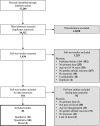Understanding Factors that Shape Gender Attitudes in Early Adolescence Globally: A Mixed-Methods Systematic Review
- PMID: 27341206
- PMCID: PMC4920358
- DOI: 10.1371/journal.pone.0157805
Understanding Factors that Shape Gender Attitudes in Early Adolescence Globally: A Mixed-Methods Systematic Review
Abstract
Background: Early adolescence (ages 10-14) is a period of increased expectations for boys and girls to adhere to socially constructed and often stereotypical norms that perpetuate gender inequalities. The endorsement of such gender norms is closely linked to poor adolescent sexual and reproductive and other health-related outcomes yet little is known about the factors that influence young adolescents' personal gender attitudes.
Objectives: To explore factors that shape gender attitudes in early adolescence across different cultural settings globally.
Methods: A mixed-methods systematic review was conducted of the peer-reviewed literature in 12 databases from 1984-2014. Four reviewers screened the titles and abstracts of articles and reviewed full text articles in duplicate. Data extraction and quality assessments were conducted using standardized templates by study design. Thematic analysis was used to synthesize quantitative and qualitative data organized by the social-ecological framework (individual, interpersonal and community/societal-level factors influencing gender attitudes).
Results: Eighty-two studies (46 quantitative, 31 qualitative, 5 mixed-methods) spanning 29 countries were included. Ninety percent of studies were from North America or Western Europe. The review findings indicate that young adolescents, across cultural settings, commonly express stereotypical or inequitable gender attitudes, and such attitudes appear to vary by individual sociodemographic characteristics (sex, race/ethnicity and immigration, social class, and age). Findings highlight that interpersonal influences (family and peers) are central influences on young adolescents' construction of gender attitudes, and these gender socialization processes differ for boys and girls. The role of community factors (e.g. media) is less clear though there is some evidence that schools may reinforce stereotypical gender attitudes among young adolescents.
Conclusions: The findings from this review suggest that young adolescents in different cultural settings commonly endorse norms that perpetuate gender inequalities, and that parents and peers are especially central in shaping such attitudes. Programs to promote equitable gender attitudes thus need to move beyond a focus on individuals to target their interpersonal relationships and wider social environments. Such programs need to start early and be tailored to the unique needs of sub-populations of boys and girls. Longitudinal studies, particularly from low-and middle-income countries, are needed to better understand how gender attitudes unfold in adolescence and to identify the key points for intervention.
Conflict of interest statement
Figures
Similar articles
-
Factors that influence parents' and informal caregivers' views and practices regarding routine childhood vaccination: a qualitative evidence synthesis.Cochrane Database Syst Rev. 2021 Oct 27;10(10):CD013265. doi: 10.1002/14651858.CD013265.pub2. Cochrane Database Syst Rev. 2021. PMID: 34706066 Free PMC article.
-
Survivor, family and professional experiences of psychosocial interventions for sexual abuse and violence: a qualitative evidence synthesis.Cochrane Database Syst Rev. 2022 Oct 4;10(10):CD013648. doi: 10.1002/14651858.CD013648.pub2. Cochrane Database Syst Rev. 2022. PMID: 36194890 Free PMC article.
-
Health professionals' experience of teamwork education in acute hospital settings: a systematic review of qualitative literature.JBI Database System Rev Implement Rep. 2016 Apr;14(4):96-137. doi: 10.11124/JBISRIR-2016-1843. JBI Database System Rev Implement Rep. 2016. PMID: 27532314
-
Parents' and informal caregivers' views and experiences of communication about routine childhood vaccination: a synthesis of qualitative evidence.Cochrane Database Syst Rev. 2017 Feb 7;2(2):CD011787. doi: 10.1002/14651858.CD011787.pub2. Cochrane Database Syst Rev. 2017. PMID: 28169420 Free PMC article.
-
Eliciting adverse effects data from participants in clinical trials.Cochrane Database Syst Rev. 2018 Jan 16;1(1):MR000039. doi: 10.1002/14651858.MR000039.pub2. Cochrane Database Syst Rev. 2018. PMID: 29372930 Free PMC article.
Cited by
-
Gender discrimination and illicit drug use among African American and European American adolescents and emerging adults.Psychol Addict Behav. 2021 May;35(3):310-319. doi: 10.1037/adb0000683. Epub 2020 Sep 10. Psychol Addict Behav. 2021. PMID: 32914989 Free PMC article.
-
Any better? A follow-up content analysis of adolescent sexual and reproductive health inclusion in Global Financing Facility country planning documents.Glob Health Action. 2024 Dec 31;17(1):2315644. doi: 10.1080/16549716.2024.2315644. Epub 2024 Jun 19. Glob Health Action. 2024. PMID: 38962875 Free PMC article.
-
Education, poverty and "purity" in the context of adolescent girls' secondary school retention and dropout: A qualitative study from Karnataka, southern India.PLoS One. 2018 Sep 5;13(9):e0202470. doi: 10.1371/journal.pone.0202470. eCollection 2018. PLoS One. 2018. PMID: 30183747 Free PMC article.
-
A 10 year (2011-2021) systematic review of teen dating violence prevention programs.J Inj Violence Res. 2022 Jul 23;14(3):209-24. doi: 10.5249/jivr.v14i3.1739. Online ahead of print. J Inj Violence Res. 2022. PMID: 35869841 Free PMC article.
-
Measuring young adolescent perceptions of relationships: A vignette-based approach to exploring gender equality.PLoS One. 2019 Jun 27;14(6):e0218863. doi: 10.1371/journal.pone.0218863. eCollection 2019. PLoS One. 2019. PMID: 31247045 Free PMC article.
References
-
- WHO. Health for the World's Adolescents A second change in the second decade. Geneva: WHO; 2014.
-
- UNFPA. The power of 1.8 billion Adolescents, youth and the transformation of the future. New York: UNFPA; 2014.
-
- Blum RW, Bastos FIPM, Kabiru CW, Le LC. Adolescent health in the 21st century. The Lancet. 2012;379: 1567–1568. - PubMed
-
- UNICEF. Progress for children A report card on adolescents. New York: UNICEF; 2012. - PubMed
Publication types
MeSH terms
Grants and funding
LinkOut - more resources
Full Text Sources
Other Literature Sources
Medical


